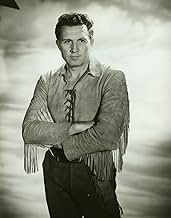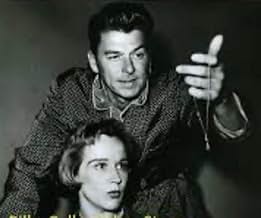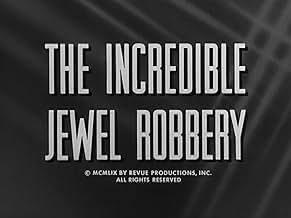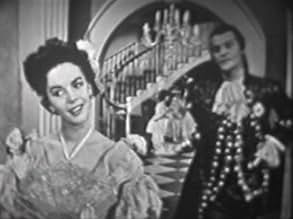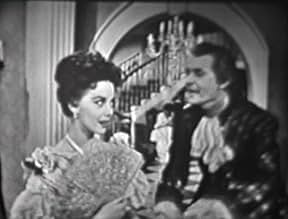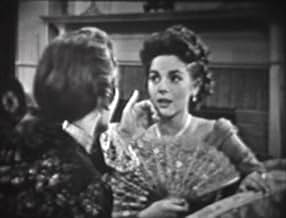Ajouter une intrigue dans votre langueAn American anthology series, with a new episode and different actors and actresses each week.An American anthology series, with a new episode and different actors and actresses each week.An American anthology series, with a new episode and different actors and actresses each week.
- Nommé pour 11 prix Primetime Emmy
- 2 victoires et 13 nominations au total
Parcourir les épisodes
Histoire
Le saviez-vous
- AnecdotesThe show's sponsor, General Electric, owned the rights to the series from 2004 to 2011 as majority owner of NBC Universal Television, the successor to Revue Studios that was formed following the NBC/"Universal" merger from the combination of NBC with "Universal Television." "NBC Universal" has been controlled by Comcast since 2011, and fully owned by them since 2013.
- ConnexionsFeatured in Classic Sci-Fi TV: 150 Episodes (2009)
Commentaire en vedette
"General Electric Theater" was one of the many excellent anthology series during the Golden Age of American television. It's easy to see why corporate sponsors often inserted their names into the titles of these series: the episodes were often of a high standard, catering for an intelligent audience.
"G.E. Theater" was hosted by Ronald Reagan, at a time when his acting career had hit a slump and he was mulling a career change. More than any other acting role, Reagan's stint as host of "G.E. Theater" (and corporate spokesman for General Electric) was instrumental in his political career. While this series was in production, General Electric sent Reagan to make personal appearances at G.E. factories all over the United States. Reagan met the factory employees and listened to their concerns, getting to meet the public (and taking an interest in their problems) as he never was able to do during his years as a second-string leading man at Warner Brothers. These experiences inspired him to run for public office.
This posting relates specifically to "Blaze of Glory", an above-average episode of "General Electric Theater" which aired in 1958, starring Lou Costello in a rare dramatic role, following his break-up with Bud Abbott. The split-up of Abbott & Costello had been one of the most vicious and acrimonious split-ups in show-biz history (which is saying a great deal), and Costello was now making a creditable effort to continue his career in a different direction. Unfortunately, he was a difficult type to cast in dramatic roles ... but he gives an excellent performance here.
"Blaze of Glory" stars Lou Costello as a bumbling plumber (slightly more intelligent than his usual comedy roles) who is sent to a hotel suite to repair a leaky pipe. But the suite is now occupied by a gang of crooks planning their latest robbery. The leader of the crooks (with a poncy foreign name) is played by Jonathan Harris: this was a few years before Harris played Dr Zachary Smith on "Lost in Space", yet Harris's performance here is almost exactly the same as his Dr Smith. Harris is meant to be playing a Moriarty-style criminal genius, but he's not very believable. Even less believable are the no-talent actors who play his deeze-dem-doze henchmen.
Harris and his henchmen are planning their next caper. When plumber Costello accidentally overhears their plans, he tries to slip out ... but clumsily makes his presence known. Harris and the other crooks capture Costello, planning to kill him. In a fairly implausible climax, Costello manages to outwit Harris and turn the tables on him, capturing all the crooks single-handed.
The script is pretty bad, far below the usual high standard for "General Electric Theater". But Lou Costello turns in an excellent performance with this poor material, and almost single-handedly elevates it to excellence. It's a shame that he got so few chances to play dramatic roles. On the strength of Costello's performance, I highly recommend "Blaze of Glory" ... not just to Abbott & Costello fans, but to everyone interested in drama from the Golden Age of television.
"G.E. Theater" was hosted by Ronald Reagan, at a time when his acting career had hit a slump and he was mulling a career change. More than any other acting role, Reagan's stint as host of "G.E. Theater" (and corporate spokesman for General Electric) was instrumental in his political career. While this series was in production, General Electric sent Reagan to make personal appearances at G.E. factories all over the United States. Reagan met the factory employees and listened to their concerns, getting to meet the public (and taking an interest in their problems) as he never was able to do during his years as a second-string leading man at Warner Brothers. These experiences inspired him to run for public office.
This posting relates specifically to "Blaze of Glory", an above-average episode of "General Electric Theater" which aired in 1958, starring Lou Costello in a rare dramatic role, following his break-up with Bud Abbott. The split-up of Abbott & Costello had been one of the most vicious and acrimonious split-ups in show-biz history (which is saying a great deal), and Costello was now making a creditable effort to continue his career in a different direction. Unfortunately, he was a difficult type to cast in dramatic roles ... but he gives an excellent performance here.
"Blaze of Glory" stars Lou Costello as a bumbling plumber (slightly more intelligent than his usual comedy roles) who is sent to a hotel suite to repair a leaky pipe. But the suite is now occupied by a gang of crooks planning their latest robbery. The leader of the crooks (with a poncy foreign name) is played by Jonathan Harris: this was a few years before Harris played Dr Zachary Smith on "Lost in Space", yet Harris's performance here is almost exactly the same as his Dr Smith. Harris is meant to be playing a Moriarty-style criminal genius, but he's not very believable. Even less believable are the no-talent actors who play his deeze-dem-doze henchmen.
Harris and his henchmen are planning their next caper. When plumber Costello accidentally overhears their plans, he tries to slip out ... but clumsily makes his presence known. Harris and the other crooks capture Costello, planning to kill him. In a fairly implausible climax, Costello manages to outwit Harris and turn the tables on him, capturing all the crooks single-handed.
The script is pretty bad, far below the usual high standard for "General Electric Theater". But Lou Costello turns in an excellent performance with this poor material, and almost single-handedly elevates it to excellence. It's a shame that he got so few chances to play dramatic roles. On the strength of Costello's performance, I highly recommend "Blaze of Glory" ... not just to Abbott & Costello fans, but to everyone interested in drama from the Golden Age of television.
- F Gwynplaine MacIntyre
- 25 août 2002
- Lien permanent
Meilleurs choix
Connectez-vous pour évaluer et surveiller les recommandations personnalisées
- How many seasons does General Electric Theater have?Propulsé par Alexa
Détails
- Durée30 minutes
- Couleur
- Rapport de forme
- 1.33 : 1
Contribuer à cette page
Suggérer une modification ou ajouter du contenu manquant

Lacune principale
By what name was General Electric Theater (1953) officially released in India in English?
Répondre
